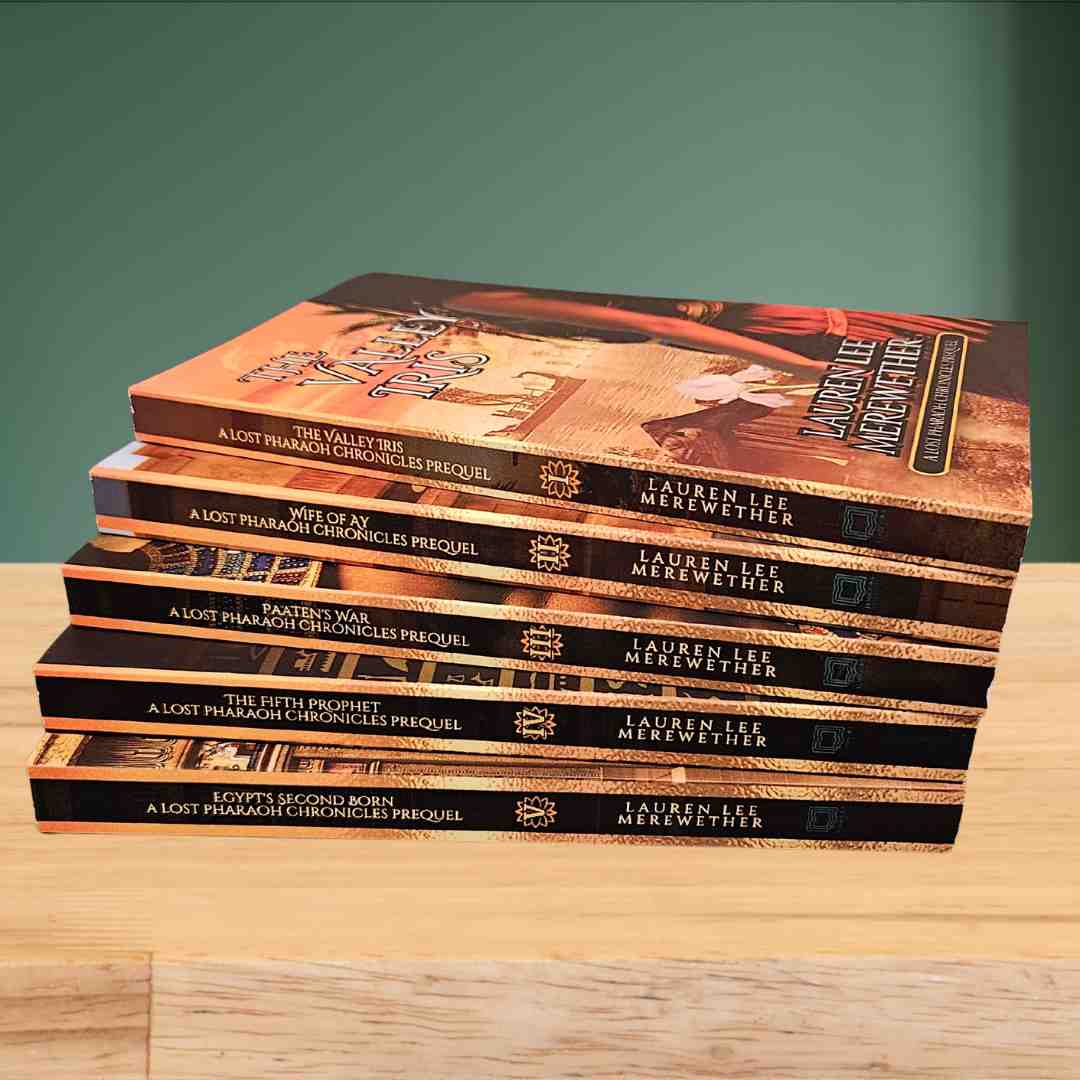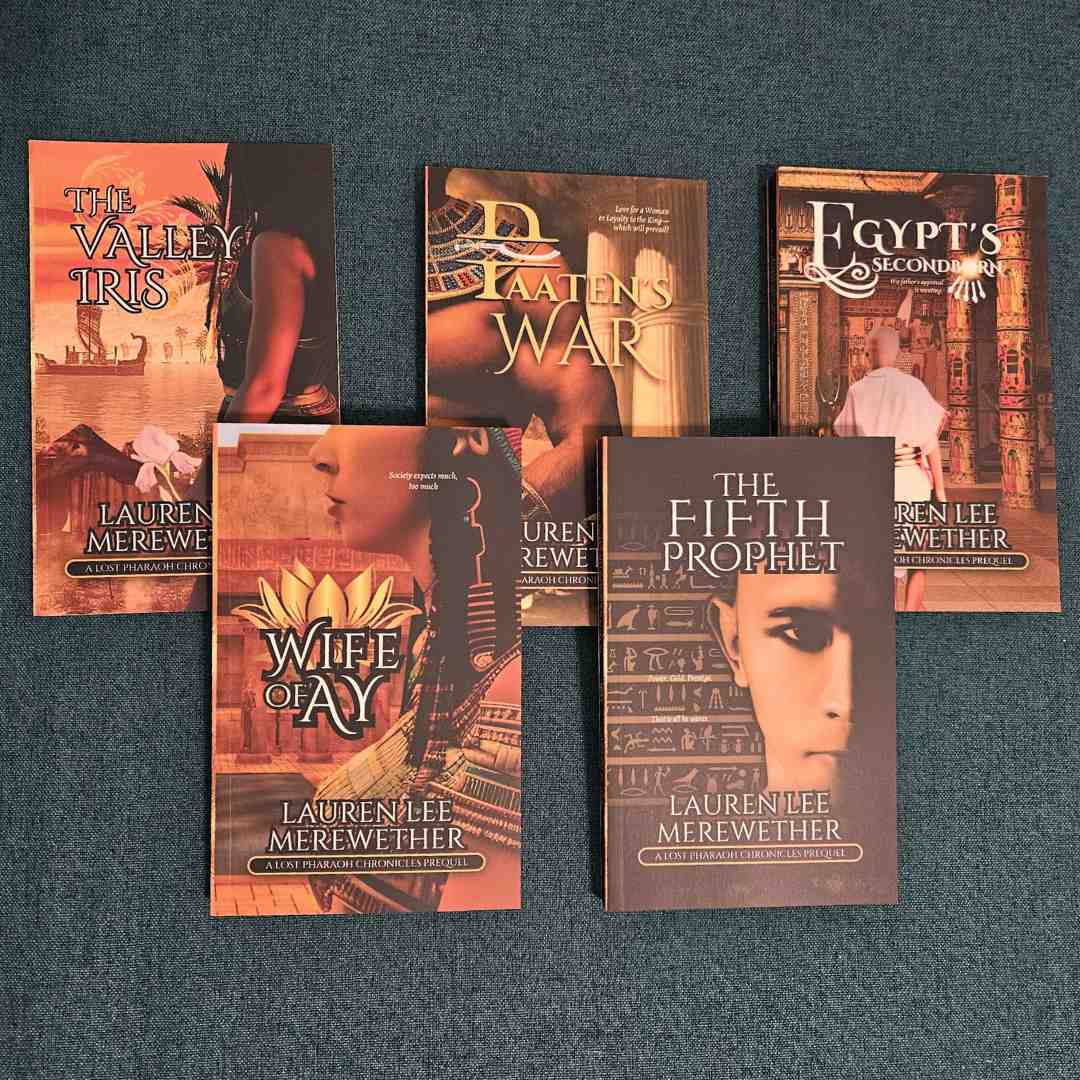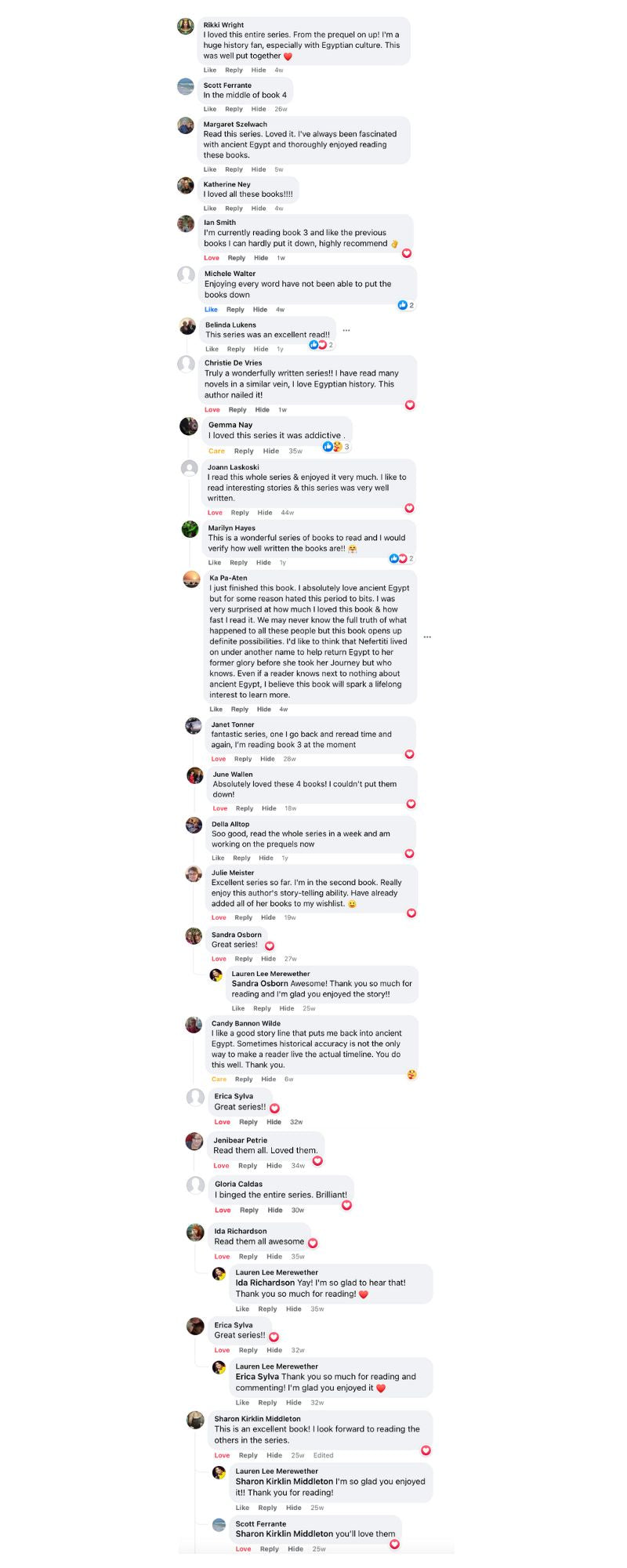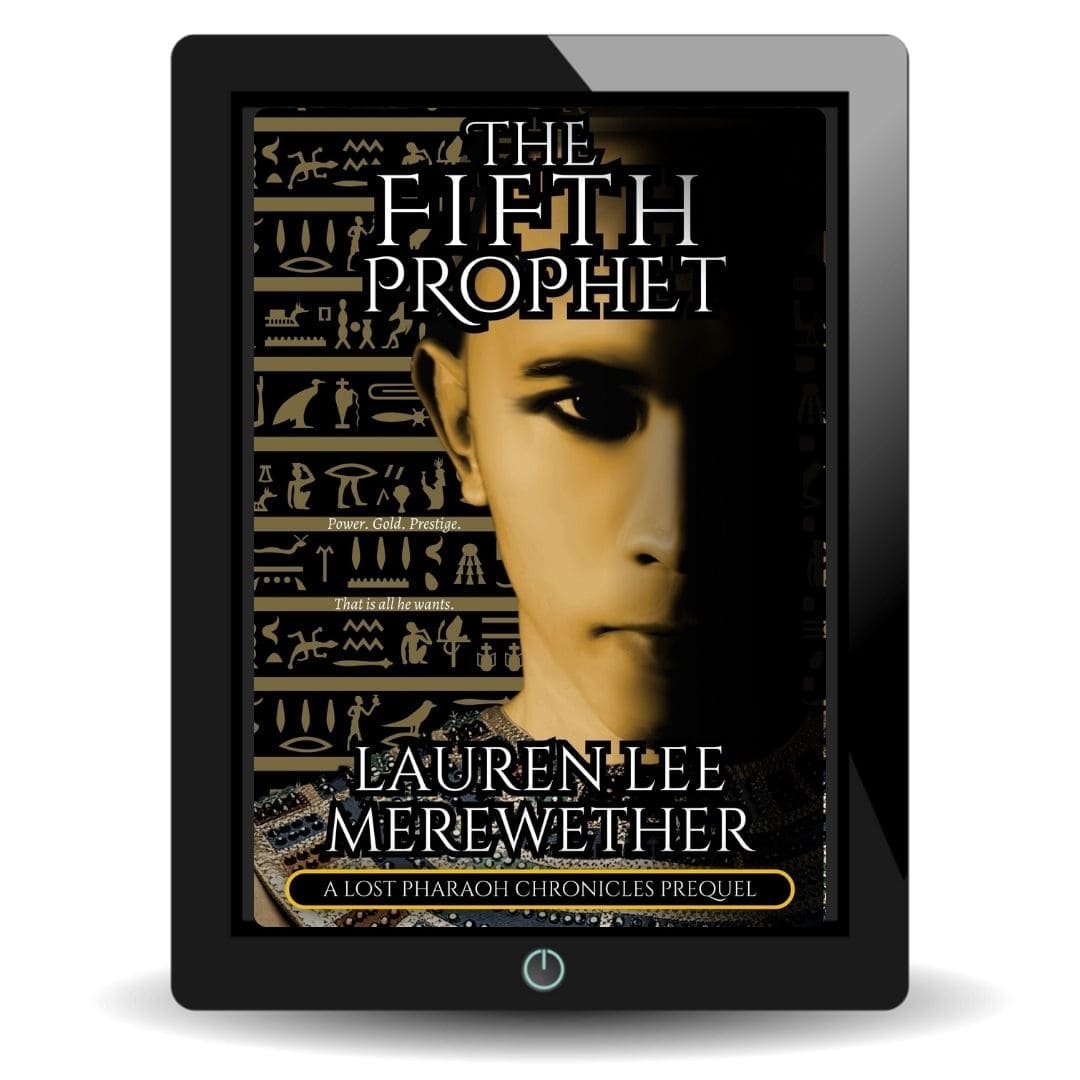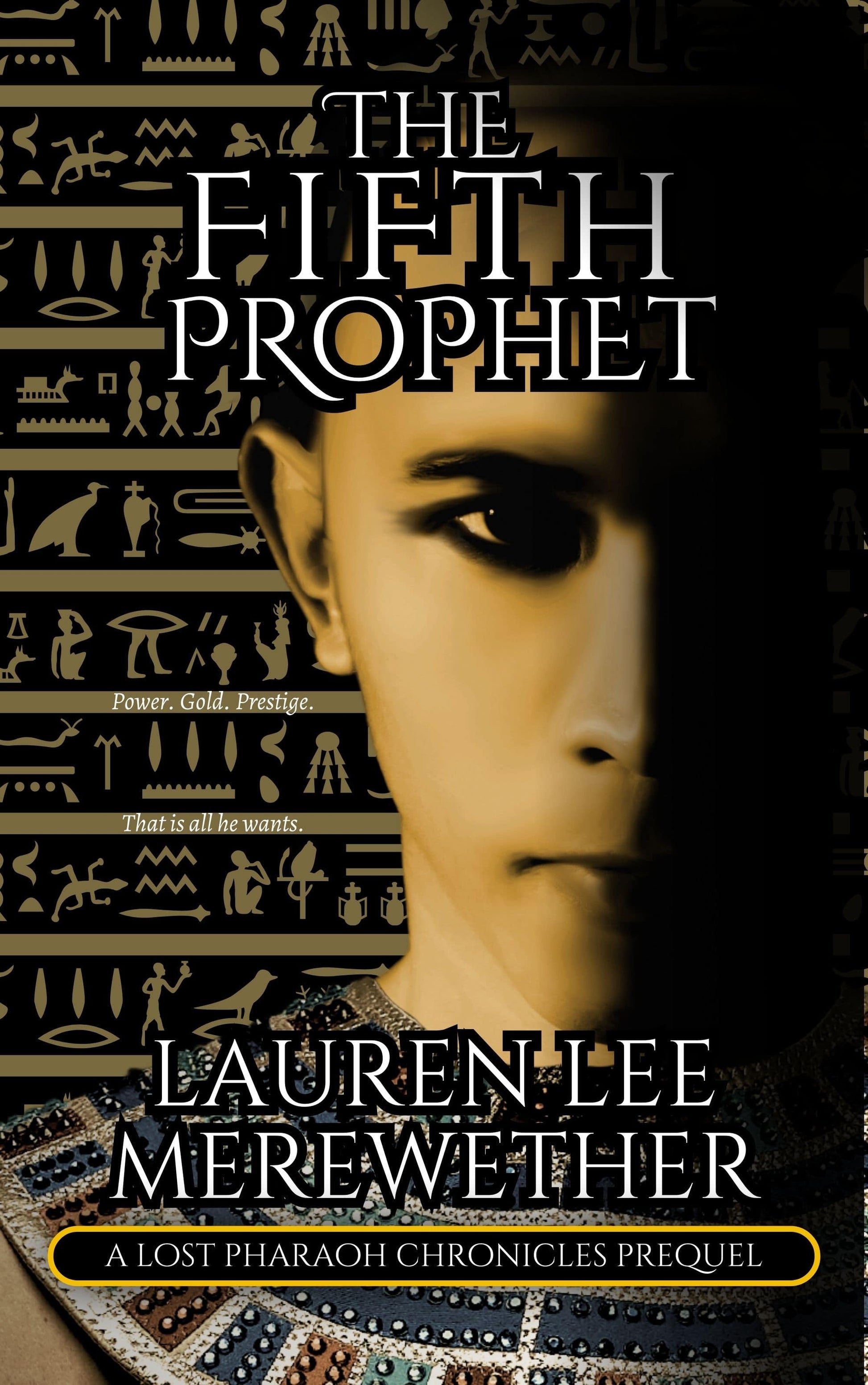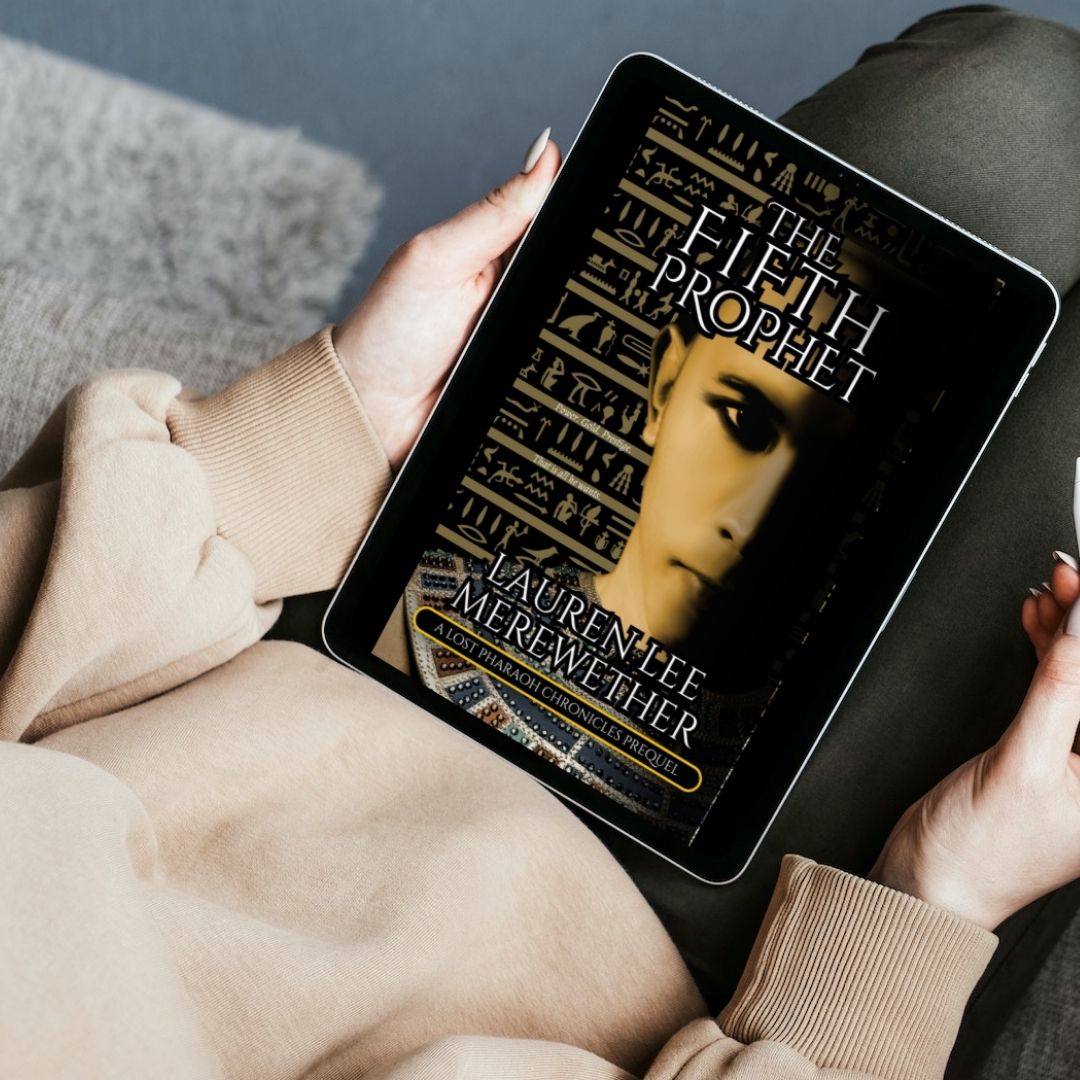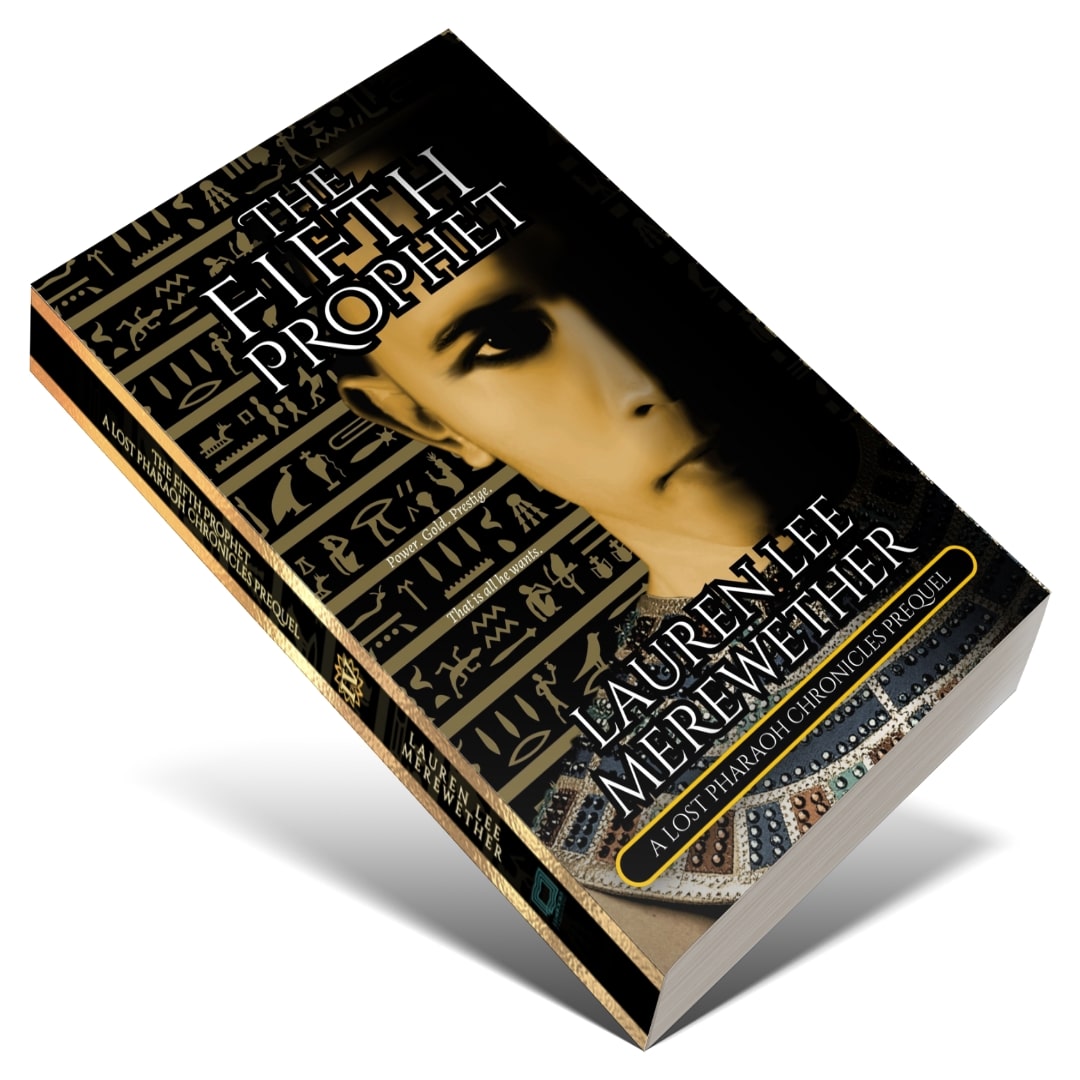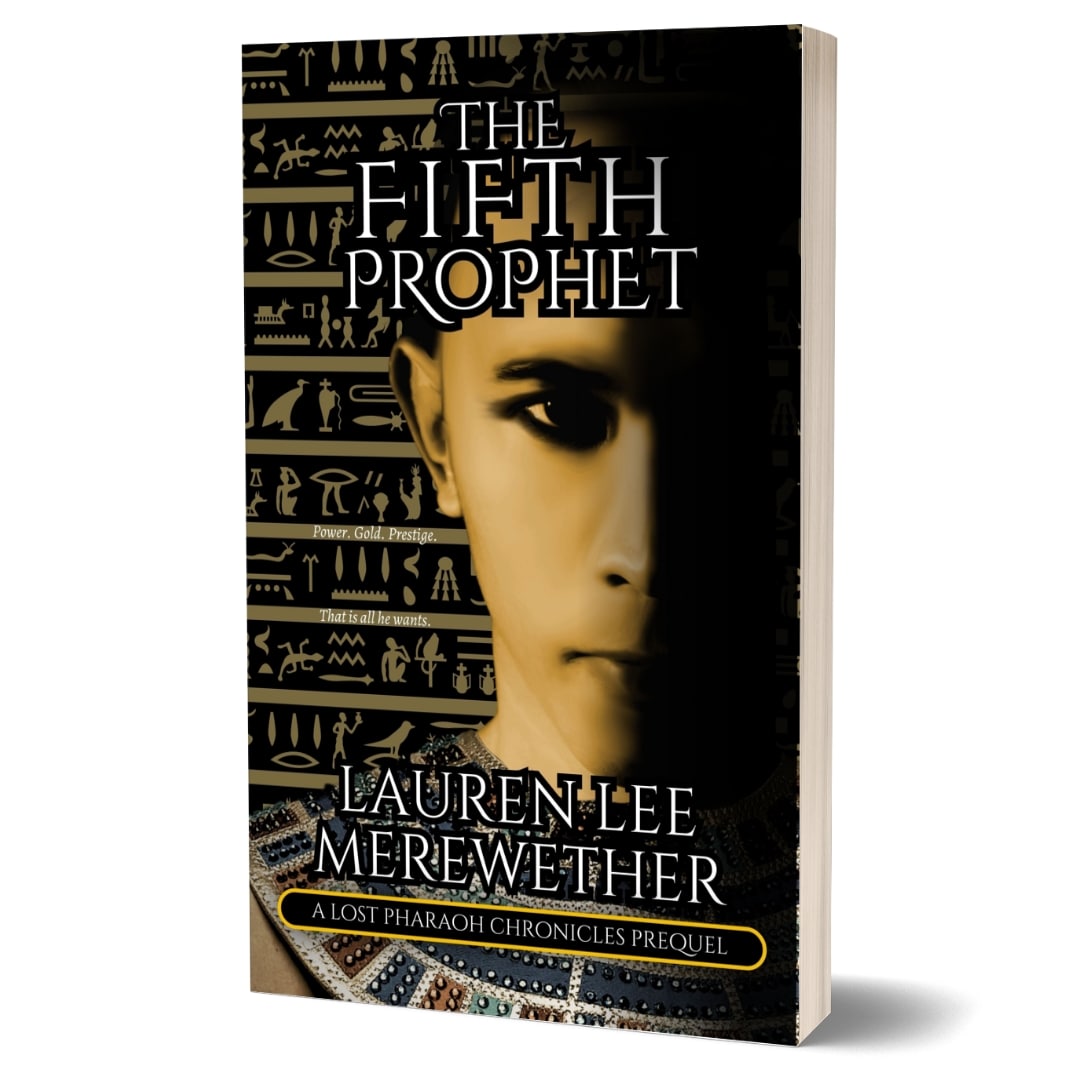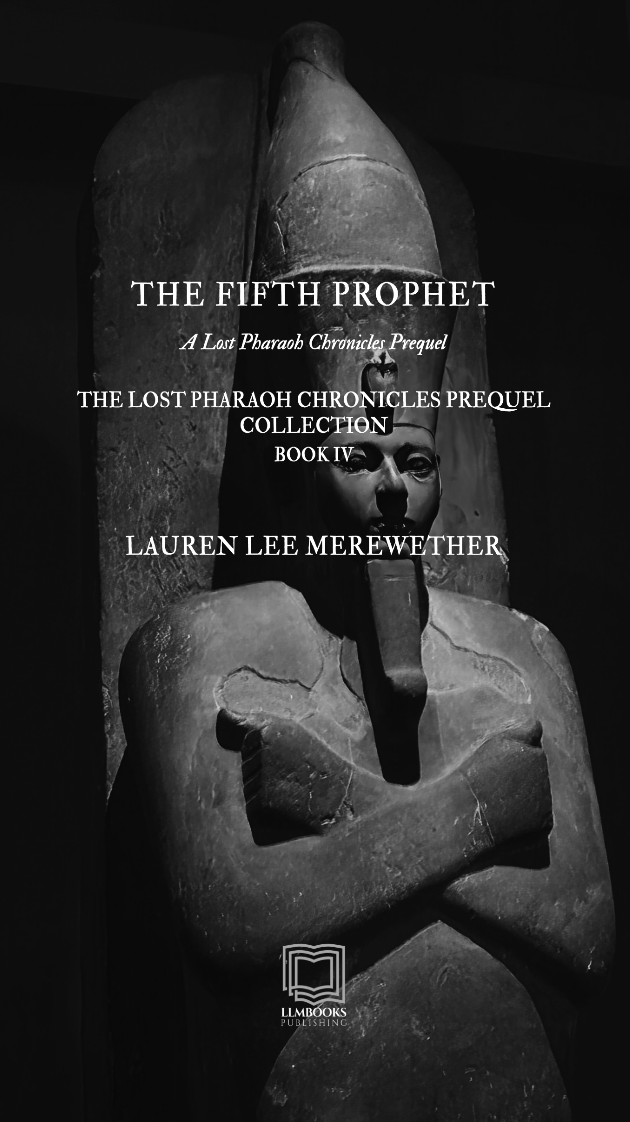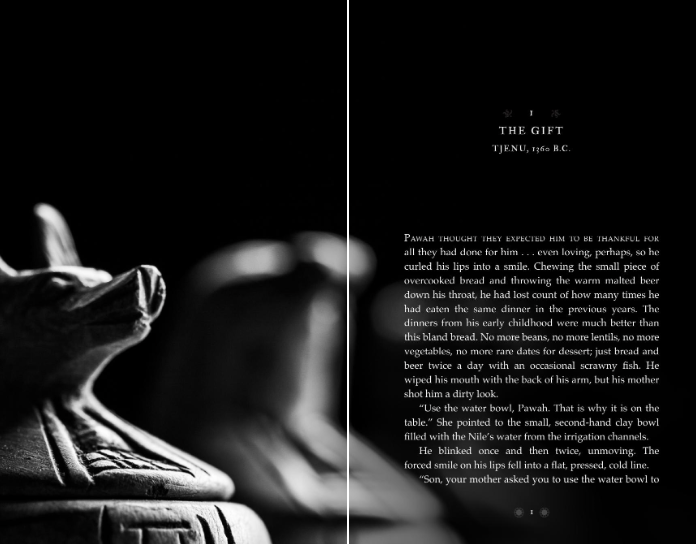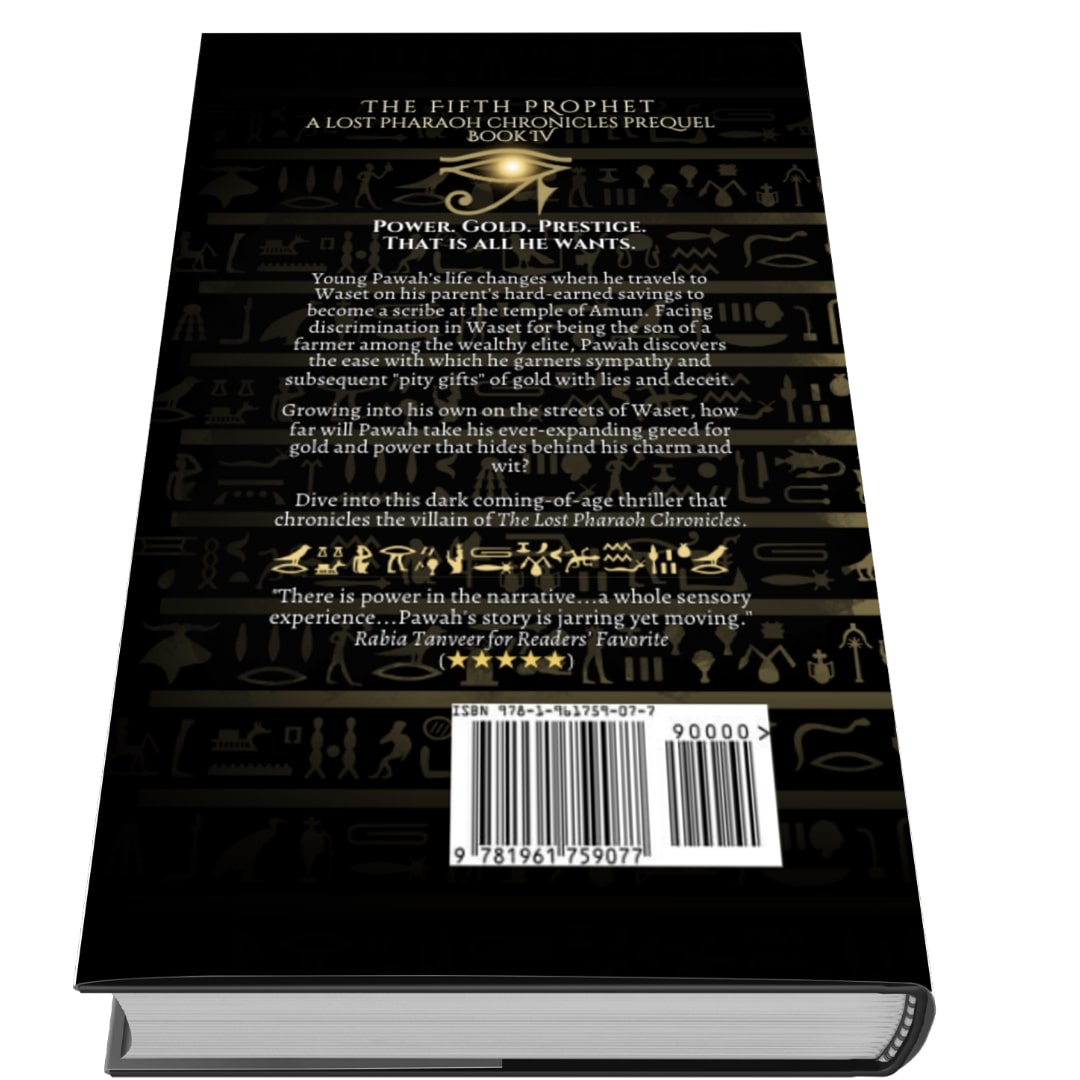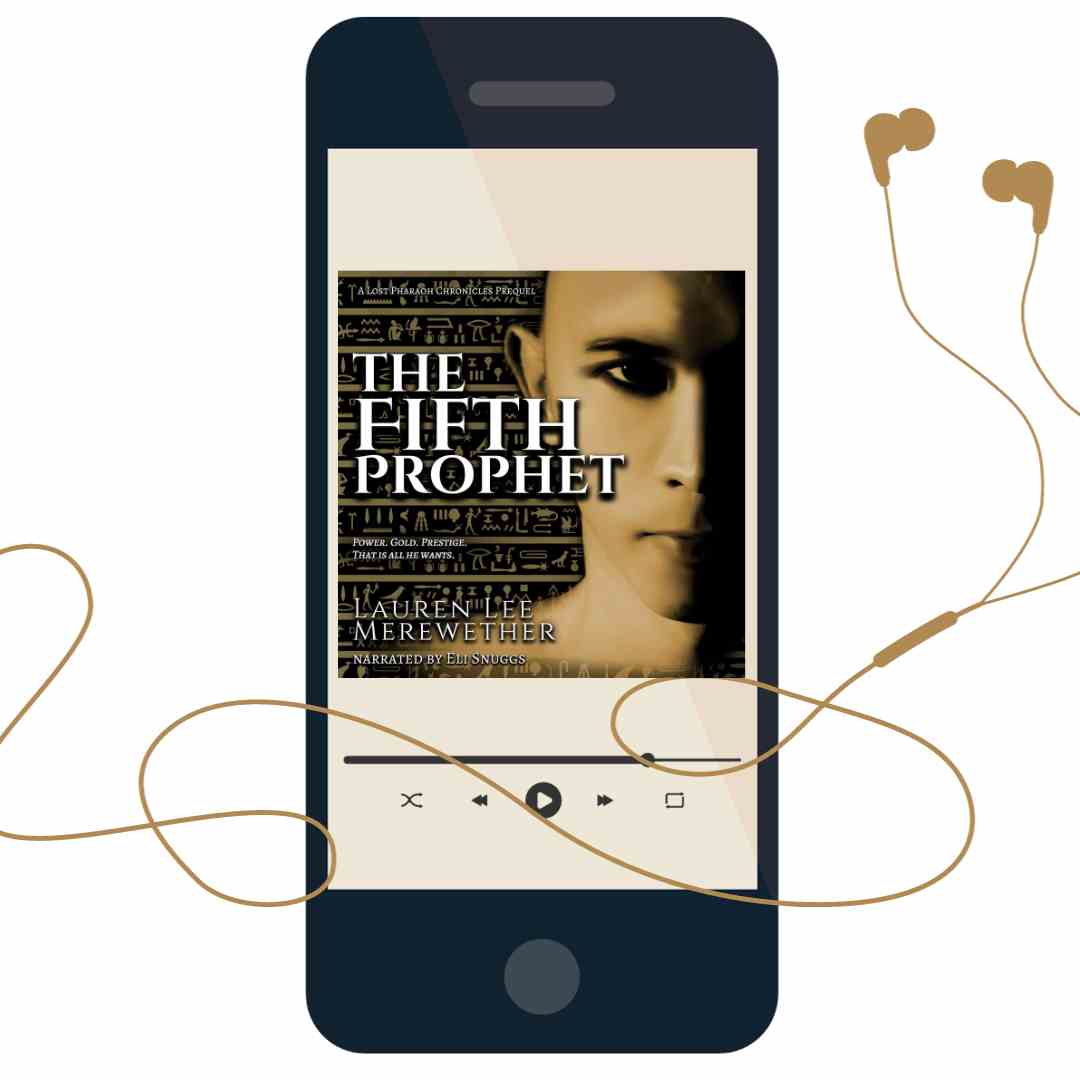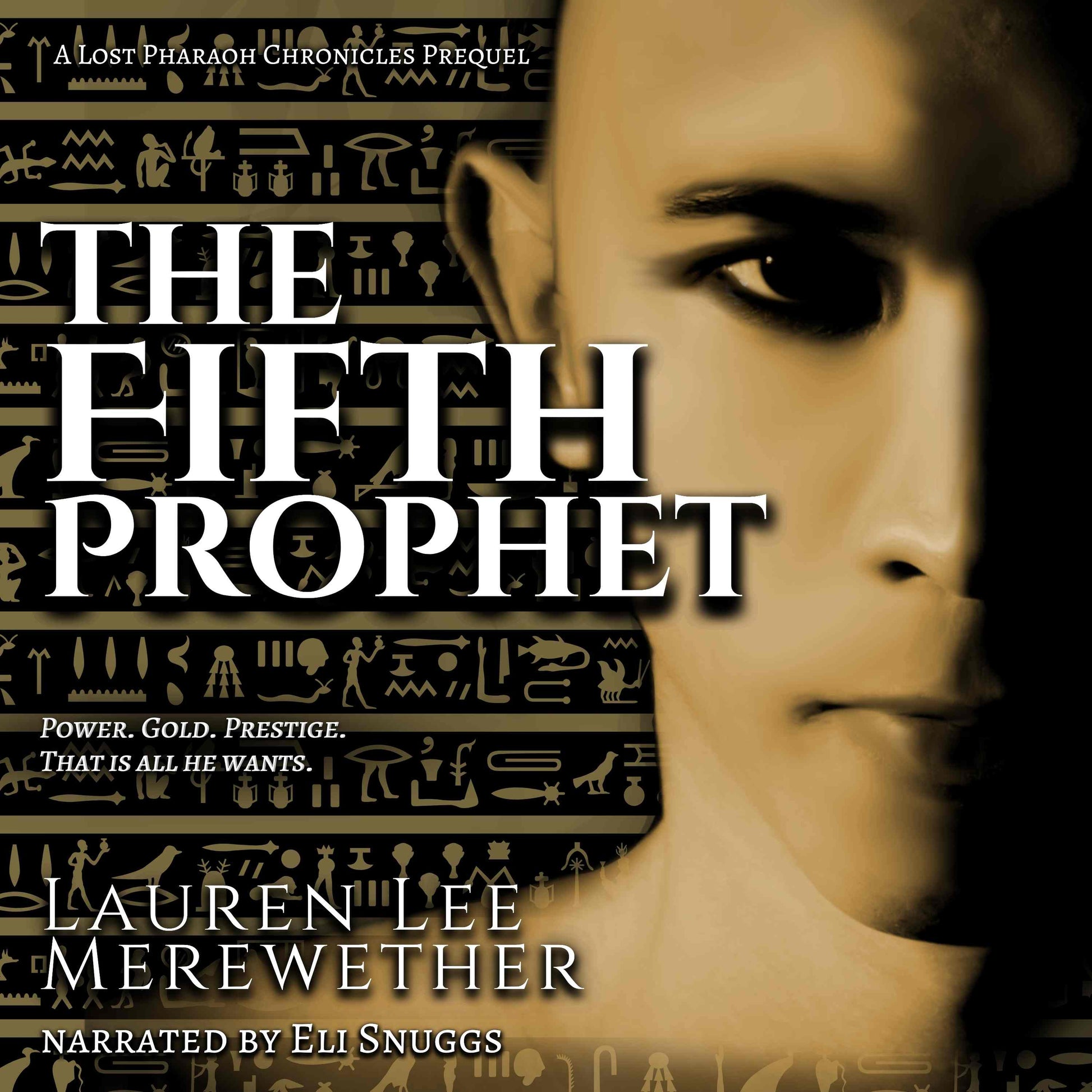The Fifth Prophet
The Fifth Prophet
Power. Gold. Prestige. That is all he wants.
Young Pawah’s life changes when he travels to Waset on his parent’s hard-earned savings to become a scribe at the temple of Amun. Facing discrimination in Waset for being the son of a farmer among the wealthy elite, Pawah discovers the ease with which he garners sympathy and subsequent "pity gifts" of gold with lies and deceit.
Growing into his own on the streets of Waset, how far will Pawah take his ever-expanding greed for gold and power that hides behind his charm and wit?
The Fifth Prophet was a semi-finalist in the 2021 KBR Awards in Horror/Suspense.
Couldn't load pickup availability
- Purchase Digital Items
- Instantly Receive Link via Email
- Send to your Preferred Device or App and Enjoy!
- For Direct Paperback Purchase
- Special Edition: Exclusive Cover and Interior Formatting
- Shipped Directly from Print Service to You
Main Tropes and Themes
- Coming of Age
- Dysfunctional Family
- Manipulation
- Murder
- Psychological Suspense
- Power at a Price
What is this story about?
What is this story about?
Power. Gold. Prestige. That is all he wants.
Young Pawah’s life changes when he travels to Waset on his parent’s hard-earned savings to become a scribe at the temple of Amun. Facing discrimination in Waset for being the son of a farmer among the wealthy elite, Pawah discovers the ease with which he garners sympathy and subsequent "pity gifts" of gold with lies and deceit.
Growing into his own on the streets of Waset, how far will Pawah take his ever-expanding greed for gold and power that hides behind his charm and wit?
Dive into this dark coming-of-age thriller that chronicles the villain of The Lost Pharaoh Chronicles.
Who is this story for?
Who is this story for?
Perfect for fans of dark, emotive origin stories and Egyptophiles everywhere.
For anyone who loves thrillers and Ancient Egyptian historical retellings, this Lost Pharaoh Chronicles prequel offers a compelling and imaginative, albeit 100% fictional, take on an obscure prophet from the Amarna period of the 18th Dynasty.
With its richly detailed world-building and complex characters, The Fifth Prophet is a must-read for anyone who loves tales of manipulation, murder, and psychological thrillers.
Grab this gripping historical drama today.
Content Disclaimers
Content Disclaimers
Author Rating:
The author rated this book for ages 14+ for domestic abuse, brief animal cruelty, violence, and dark adult themes.
Chapter 1 Preview
Chapter 1 Preview
The Gift
Tjenu, 1360 BC
Pawah thought they expected him to be thankful for all they had done for him . . . even loving, perhaps, so he curled his lips into a smile. Chewing the small piece of overcooked bread and throwing the warm malted beer down his throat, he had lost count of how many times he had eaten the same dinner in the previous years. The dinners from his early childhood were much better than this bland bread. No more beans, no more lentils, no more vegetables, no more rare dates for dessert; just bread and beer twice a day with an occasional scrawny fish. He wiped his mouth with the back of his arm, but his mother shot him a dirty look.
“Use the water bowl, Pawah. That is why it is on the table.” She pointed to the small, second-hand clay bowl filled with the Nile’s water from the irrigation channels.
He blinked once and then twice, unmoving. The forced smile on his lips fell into a flat, pressed, cold line.
“Son, your mother asked you to use the water bowl to clean your hands.” His father held a piece of bread in the air and used it to emphasize his words.
Pawah tilted his head at his mother and peered down at her hands. Dirt from the day's work of making beads and tilling their small garden to supplement his father’s rations for their table was stuck in thick black lines under her nails. He wanted to throw the water in that bowl on her nasty hands. Maybe he would if she did not take the initiative.
His mother fidgeted, and her eyes darted between her son and her own hands. She finally dipped her own fingers in the water and shook the water off before she placed them neatly in her lap and let out a shaky breath.
“Now, your turn.” She nodded toward the water bowl.
Pawah sighed, more because he couldn’t experience throwing water on his mother and not so much because he chose to obey her. He sat up off of his heels to reach the water bowl. He dipped his fingers in the chilly water. Shaking the water from his finger, he intentionally slung some water on the bread in the middle of the table, but he continued shaking his hands toward the ground to make it seem accidental.
His father stared at his son, almost sensing the defiance. He swallowed his hard piece of bread before he spoke. “Now, Pawah, you do not wait that long to do what your mother tells you to do. She only wants the best for you.”
Pawah pursed his lips as his intense gaze jumped from his father back to his mother. I want more than just bread! Where are the radishes?! Where are the leeks?! Where are the lentils and beans?! I know we have them! I help tend the garden! I saw them! The best for me is to give me a full dinner! Not to dip my fingers in a cursed water bowl!
His father bent forward, ripping another piece of bread from the communal plate. He took a large bite out of the bread with an annoyed chomp. As he rolled his food in his mouth, the silence at the table created the usual tension.
“What is it, Son? Ask your question. Make your statement.” He rubbed his temple with his free hand.
Pawah pondered how to word his request such that his parents might give him more bread, or at least some beans. Every other night, his request had gone unfulfilled. Perhaps tonight would be different. His tongue wet his lips so the words would more easily come from his mouth.
“Every day, I see you both work from before the sun rises to after the sun sets.” He nodded, knowing his father liked to be told he was a hard worker. “I do as well to help Ast, but all we eat is bread?” Pawah gestured to the table and then to his straw cot on the dirt floor—a cot too small for his height. “I am hungry. I go to sleep hungry.”
“You have food to eat. You are so lucky! You should be thankful for what we provide you!” His father dropped a fist onto the table as his mother’s eyes dropped to the floor. “And you will call your mother, ‘Mother,’ not ‘Ast’!”
“Her name is Ast!” Pawah screamed, slamming both fists on the table.
Again, his request was denied. Tomorrow night, he would call her “Mother,” and then the old man might give him more food and not shut him down with the same “be grateful” speech.
His father chewed his lip as his heavy brow cast a shadow over his eyes in the candlelight. He appeared to calm his anger through a long inhale and exhale through his nose. His fist curled, and his index finger jutted out to point at the bread in front of his son. Words narrowly escaped through his clenched teeth.
“Pawah . . . Eat. Your. Food.” He took the last bite of his bread and let his hand drop to the table. The sun had charred his skin, and his wife’s skin was not too far behind.
Pawah looked to his own skin and noticed it bore the anger of the sun much more this year than last: the sign of a worker, the farmer, the lowest class.
His father’s fingers drummed the table as he watched Pawah observe his arms.
“All jobs are significant, even the smallest ones,” his father said through a tight jaw, chewing with intent, as if he knew Pawah's thoughts.
Pawah flicked his eyes up to him. Another night speaking about how great his work is when he cannot even provide a full dinner for his son!
“Then why do they give more grain, and even copper and bronze, to those who do not work the fields? Or gold to men like Citizen Menhu?” Pawah lifted his chin to his father, having asked this question many times, but the answer never quite satisfied him. His knuckles went white, and he wondered what it would feel like to beat a good answer out of the man who sat across from him.
“All jobs are important!” his father yelled with nostrils flaring. “Even that of a farmer! Without men like me, Egypt would starve!”
“Am I to be like you for the rest of my days?!” Pawah placed both hands on the table and rose to his knees, fueled by his father’s nightly repeated response. Then he blurted out, “I do not care if Egypt starves! I want a full dinner! Do your job and feed your son!”
His father also rose off of his heels and placed his hands on the table. He leaned forward to tower over his eleven-year-old son’s growing frame. “Sit down and eat, you selfish child!”
Pawah narrowed his eyes at his father but did as he was told, slowly. A scowl still contorted his face. His father did not scare him, but he obeyed anyway, biding his time to see how best to make this man pay for calling him a “selfish child.”
“Now,”—his father began returning his bottom to his heels—“as I was saying . . . all tasks are important, but others are more so and require more responsibility. Citizen Menhu owns the land. I farm it, and he pays me a day’s rations. He gives us this housing, and he provides me the tools I need to do my job. I cannot read or write, so I am grateful I can work with my two arms and two legs and provide for my family.” His father’s eyes glistened in the dim candlelight as he placed his hand on Ast’s arm. “And your mother also makes beads for the dressmakers and sells and trades the vegetables and dates from her garden so we can have a water bowl to clean our fingers to eat—”
“A water bowl!?” Pawah looked toward his mother as his lips peeled back in disgust. “You sold food to buy this?!” He knocked the bowl off the table and had visions of slamming it against her head. “I am hungry! I am your child! I worked that garden just as much as you! I deserve more food than this piece of bread!” Pawah leaned over, grabbed the last piece of bread from the communal plate and threw it at his mother, whose eyes welled with tears. Before his father could rebuke him, he also picked up the communal plate and threw it against the wall, breaking the hard-fired clay. “Feed your son!” he yelled as a red haze of clay dust filled the small room.
“Pawah!” His father stood and rubbed his knee as he went to grab the cane. “That is enough!”
“Yotefseneb”—his mother held her hand up to her husband—“don’t.”
“No one will treat you like that.” Yotefseneb shoved his hand toward Pawah, who stood with his feet planted heartily under his body. Pawah’s fingers were curled into fists, held tightly by his thighs. He wanted Yotefseneb to lay the cane across his back, so his father would see how miserably he would fail in punishing his son.
“Please don’t,” Ast repeated as she stood and stepped in front of Yotefseneb.
“Ast, that is why the boy speaks as he does . . . he is almost a man now, and yet you still treat him as if he were a babe!” Yotefseneb shook his head at her silence and then, after a few moments, put the cane away. He shook his head at Pawah. “One day you will understand, Son,”—he pointed his long finger at him—“and then you shall feel foolish.”
No, you shall feel foolish for starving your child! Pawah’s eyes narrowed even more while his father walked outside. Every night, Yotefseneb paced back and forth across the small plot of Menhu’s land, helping his food to digest and calming himself from the inevitable fight with his son.
“Pawah,” Ast crooned as her shoulders slumped. She wiped her face as a few tears ran down her cheeks. “I know you are hungry. Believe me when I tell you, there is no greater pain for a mother than to know her child is hungry and hurting, and she cannot feed him or help him.”
“But you can.” Pawah’s voice held flat and his stare steady. “You are stealing the goods of my work to do what? Buy water bowls?”
Ast lifted her chin to her son. “You will never get what you want by accusing, Pawah. You have many lessons to learn.” Her head shook as her finger wagged in his face.
He almost grabbed her finger, wanting to hear the snap of bone when he broke it, but she dropped her hand before he could do so.
Ast took a sweeping breath and confessed, “I bought a water bowl so you could know what to do when you eat with someone of a higher class.”
Pawah’s eyes squinted. What? His chest let a loud sigh escape. “Why would I need to eat with a water bowl?” Pawah threw his hands up. “Am I not going to be a farmer like father?”
“Pawah, you stop it, now!” His mother clapped at him.
“I am not a child!” His ears turned red hot from the scolding. He leaned his shoulders forward and pushed his slightly taller body over his mother’s head. She will pay for that!
“You are a child until you can speak like an adult!” His mother took a slight step backward.
Pawah smirked, causing his mother to slap his cheek. Maybe I should slap her too and cause her cheek to burn!
He raised his hand to hit her, but, sensing his pending attack, she grabbed his earlobe and yanked down hard. “Now, you listen!” She pressed her forehead to his as her nose wrinkled into a snarl. “How many times have I told you, Pawah?” She gave an extra yank, as if she wanted him to really listen to her this time. “How many times? I have lost count. You will never get what you want or go anywhere in this life if you do not act with charm!”
“Where will I go, Ast?!” he yelled at her, yanking his head away and causing her nail to slice a superficial cut into his earlobe.
“You will call me ‘Mother!’” Ast yelled. She pointed a finger in his face yet again. “I bore you!”
“And yet you do not feed me!” Pawah threw his arms out wide, and the urge to hit his mother came over him again. The thief-woman! “I tried to ask with charm as you requested, Mother, but you and Yotefseneb still denied me what I want . . . a full dinner!”
“Son,” she let out a heavy sigh.
He curled his fingers into a fist and began to lift his arm as she said, “We do not always get what we want.”
He winced. I will always get what I want.
“But you are ten times as likely to get it if you ask with charm.” She patted his cheek. “Now, Pawah, listen to me. I know you are hungry. So am I. So is your father. But this is what we have to eat—”
“Where is our food from the garden going?” Pawah slammed his fist into his leg. He still wanted to hit Ast, but he wanted an answer from her first, and he needed to let out his rage in some way.
She closed her eyes for a moment, drawing in another deep breath.
Pawah crossed his arms and tapped his fingers on his biceps until she opened her eyes.
Her voice now calm and her eyes at peace, she spoke. “We were going to tell you in the morning, as it would be a new day, but I can see you will not be patient. Patience is another attribute that will serve you well when you make a request.” She shook her head. “For years, your father and I have been saving to give you a gift. Most children of wealth go to scribal training when they are five. You are eleven and will be behind, but we want to send you to train to be a scribe.”
“You want to . . . or you are going to?” Pawah peered down the bridge of his nose at her.
“We are going to.” She smiled, and her eyes sparkled in the candlelight. “We can do it now.”
Finally, Pawah thought, a way out of this life in this forgotten town of Tjenu. I will have beans again.
The sparkle in her eyes grew, as did her smile. She clasped her hands under her chin.
What is she wanting? She looks happy.
After a few moments, he thought maybe his mother wanted him to be happy at this “gift” that parents should provide for their children regardless, so he smiled. But it seemed to him that he should have been given beans, lentils and dates with his meal and he should have been sent to scribal training six years earlier. He had helped with the garden and the beads.
He nodded to his mother. “I see, and when will I be sent to school?”
Ast cocked her head and furrowed her brow. “Pawah!”
“I mean . . . ” He flicked his eyes upward before resting them on his mother's intense countenance. “Thank you for sending me to scribal training.” Each word dripped with a facade of charm. I did not realize I had to be thankful for something that should be expected.
Ast crossed her arms and said nothing for a while, peering up at him. “Pawah, even if you are not excited, act as if you are excited. Your father and I have worked very hard to send you to scribal training.”
No, I worked very hard to send myself to scribal training, since you sold off all of the fruits of my labor. Pawah dropped his arms to his sides and shifted his weight. “So you want me to tell you what you want to hear?”
“You . . . ” She paused as her lips moved, but no words came out. “You . . . ” She paused again; her jaw held taut. “Yes,” she finally said. “You will find you will get what you want more quickly when you can learn to anticipate what people want.”
“I do not understand.” Pawah shook his head and crossed his arms again.
“People will help you more if they feel you want their help or if they can connect with you over something.” Ast turned her palms up as if she were trying to explain something she was not quite sure of herself.
He hummed as he thought, Interesting. I wonder if I had been doing this all along whether I would have received beans with dinner?
“The scribal session starts at the beginning of next season.” She took a cleansing breath to erase her frustrations. “Your father and I want you to have a better life than this. We have a good life and we do noble work, but we want a better life for you.” Her hands grabbed his arms and squeezed them for emphasis.
He glanced down, realizing her hands were still filthy from the day, even despite dipping them in the water bowl.
She pulled him into a big embrace. “We want to do this for you,” she whispered.
He felt his own grime under his nails and on his feet. He longed for a bath, but they only came once a decan if he was lucky. He had heard stories from the other farmers’ children that Citizen Menhu’s family bathed twice a day. It made sense, since Citizen Menhu had a bath chamber off the side of the main home, while the farmers were left to bathe in the irrigation channels or in the dangerous Nile. He smirked as he recalled the memory of putting a snake through Citizen Menhu’s bath chamber window and hearing the screams late one night.
Ast swayed him back and forth in her arms, causing his sidelock to bounce on his ear, pulling him from his memory. “We have even saved enough that you can go to the temple school of Amun,” she whispered, as her eyes brimmed with tears. “You will do the most noble of work there.”
He smiled. Yes, I will, and I will eat well too.
“And when you become well-supplied with riches, we can live in your estate in our old age.” She looked up to him. Her eyes held her smile, as if she expected him to honor the unspoken responsibility of children for their parents.
He opened his mouth to speak what was on his mind: You? Live with me? And bring all of your dirt into my house?
But he saw an anticipation in Ast’s eyes. Remembering her advice, he replied, “Yes, of course, Mother. To repay you for what you have gifted to me.”
“That is my sweet son that I know and I love.” She cupped his cheek. “I love you, Pawah, and you will eat well again. I promise you.”
This piece of advice—to make people feel they are getting what they want—will be a good asset to have, Pawah thought.
His mother’s smile made his lips twitch upward so that they mirrored hers. “I love you too.” Whatever that means . . . if love means starving someone, then I will love you and Yotefseneb too.
The reed mat that hung in the doorway hissed in the breeze as Yotefseneb stepped back inside, seeing his wife with her arms around their son. “Ast, you baby the boy. He does not need a hug; he needs a whip.”
“Yotefseneb!” Ast hushed, shaking her head. “I have told Pawah of our gift to him.”
“Oh, you have?” He stopped, and his body fell slack for a moment before straightening. The sound of his feet thudded as he marched the short distance to Pawah.
“Now you listen, boy,” he started, leaning into Pawah’s space. “You will not waste our hard work when you go to Waset. You will keep your temper under control and you will keep the lies and the disrespectful comments to yourself. If you get removed from school, I promise our goddess Bastet she cannot save you from my wrath—do you understand?”
A smugness sat on Pawah’s lips as he peered up to his father. Their eyes locked. You may be bigger than I am, slightly, but I am smarter than you. When I have no more need of you, Yotefseneb, you will reap the consequences for disrespecting me. Two more years until this sidelock comes off, and when that time comes, I shall be a scribe for Amun and you will be so lucky if I only disown you.
“Do you understand?” Yotefseneb repeated.
He blinked once and then twice, unmoving.
“Perfectly.”
“Good. Now let us turn in for the night, since you ruined what was left of dinner.” Yotefseneb turned to look at the bread on the ground.
Pawah looked at it and back at his father’s dirty body. We could still eat it. We work in the dirt all day long.
“Ast, could you please pick up, and, Pawah”—he turned back to look at his son—“could you please stake the mat down?”
Pawah narrowed his eyes at his father, but obeyed. He knelt and put the stake through the loop at the bottom of the doorway’s reed covering and then drove the stake into the dirt. It kept the larger animals out and deterred anyone who might want to rob the house. He hit the stake with the heel of his palm to wrench it into place. With each pound of the stake, though, he imagined driving it through someone’s body instead. Would it be harder? Softer? Would it hit bone? Could he hear the bone break? He stood up from his task with his fingers itching to try. Maybe one day, I will aspire to do such a thing and not get caught doing it. He smiled at the enticing thought of the risky game. One day.
“Sleep well, Son,” Ast said as she lay down next to Yotefseneb on their straw cot in the corner. “Soon you will learn to be a scribe.”
Pawah nodded.
His parents looked at him as if they were expecting him to say something. His father’s hand lingered over the candle’s flame, waiting to extinguish it.
She wants to be thanked again? Pawah lay down on his side and grabbed his rough linen blanket to throw over his body. He curled his legs so he would fit on his own straw-filled cot.
“Pawah, do you have something to say to us?” Yotefseneb wrapped an arm around his mother and placed a hand on her shoulder. Their eyes searched him.
“Thank you for sending me to be a scribe,” he muttered while rolling over to face the wall rather than his parents.
“That ungrateful—” Yotefseneb began.
Ast tapped his chest. “Not tonight, please. I am tired.”
Yotefseneb’s intense glare at the back of Pawah’s head made Pawah snicker. Finally, the old man must have licked his fingers and extinguished the candle’s flame. The house went dark, and the shadows gave birth to all of Pawah’s plans for revenge.
What would be the best method to inflict pain upon his parents for starving him? How could he repay his father for treating him so wrongly? Would he grab the cane and beat them as they slept?
He pursed his lips as he closed his eyes.
Would he squeeze their necks until they snapped, like he did with the ducks he caught near the irrigation channels?
The thrill and curiosity of his previous deeds caused him to snigger under his breath.
Or would he simply squeeze until they needed their breath and give them back their life to show them he was in control?
He let out a heavy sigh as he came to the end of his envisioning. Not tonight, but one day, when he no longer needed them for his schooling, he would give them every bit of thanks they deserved. But until then, he had to be smart. His eyes felt heavy as he continued thinking.
Yotefseneb might take away the schooling if he kept up his . . . what had Yotefseneb called it? Oh, yes . . . disrespectfulness. If that happened, he might just take their scribal training payments anyway and leave on his own to Waset. But to do that, he had to figure out where they had hidden the payment, or if they had already paid.
He would figure it out tomorrow, or better, Ast would tell him. Ast was easy to persuade into doing what he wanted; he would play the perfect son, let her lament to him about the relationship between him and Yotefseneb, and do everything she told him to do. And like every time before, she would either do as he said, or he would beat her into submission. She had learned a long time ago to keep Yotefseneb and the cane away from him or risk feeling his fists during the day. Tomorrow, Ast would divulge the location of the trade goods, either by choice or by force.
Product Information
Product Information
eBook File Size: 1.3 MB
Paperback Size: 5" x 8"
282 pages
Includes: Exclusive Cover and Interior Formatting
Printed on-demand by Lulu Direct
Book Information
Publisher: LLMBooks Publishing
Published: February 2021
ISBN-13: 979-8643858775
ASIN: B0888CW4RP
Genre: Historical Fiction
Audiobook Information
Narrated by: Eli Snuggs
Series: The Lost Pharaoh Chronicles Prequel, Book IV
Length: 6 hrs and 11 mins
Release date: 10-07-22
Language: English
Share
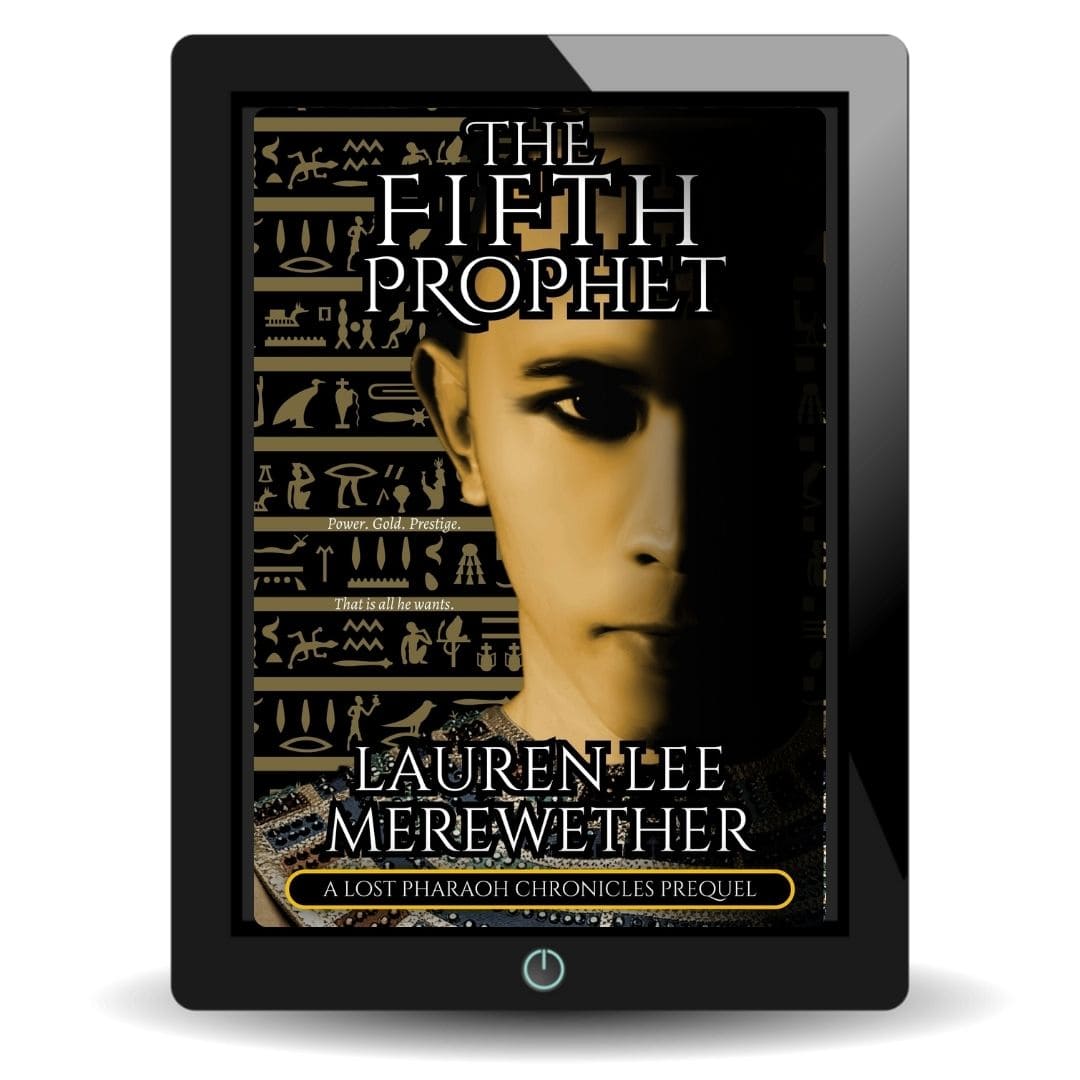
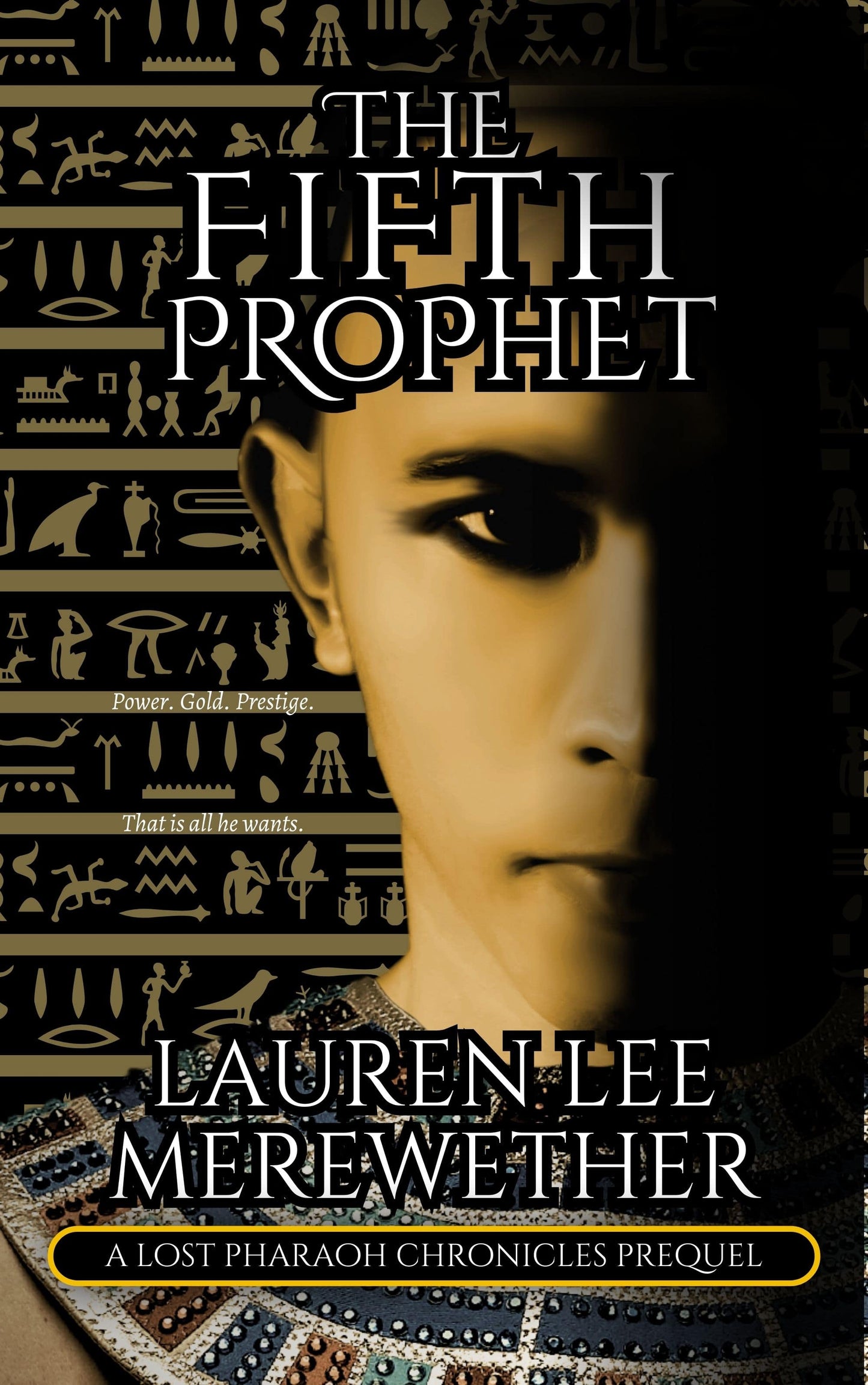

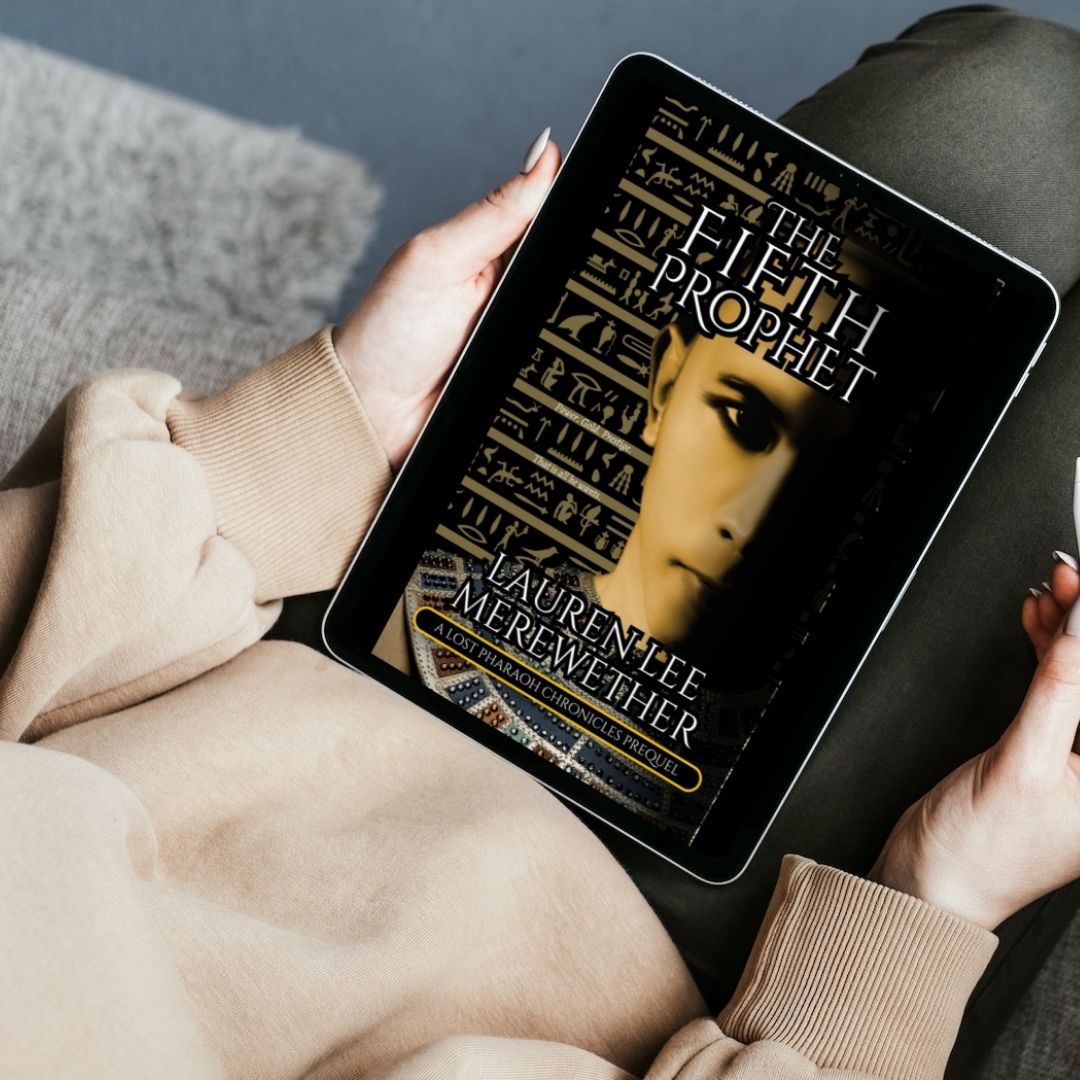
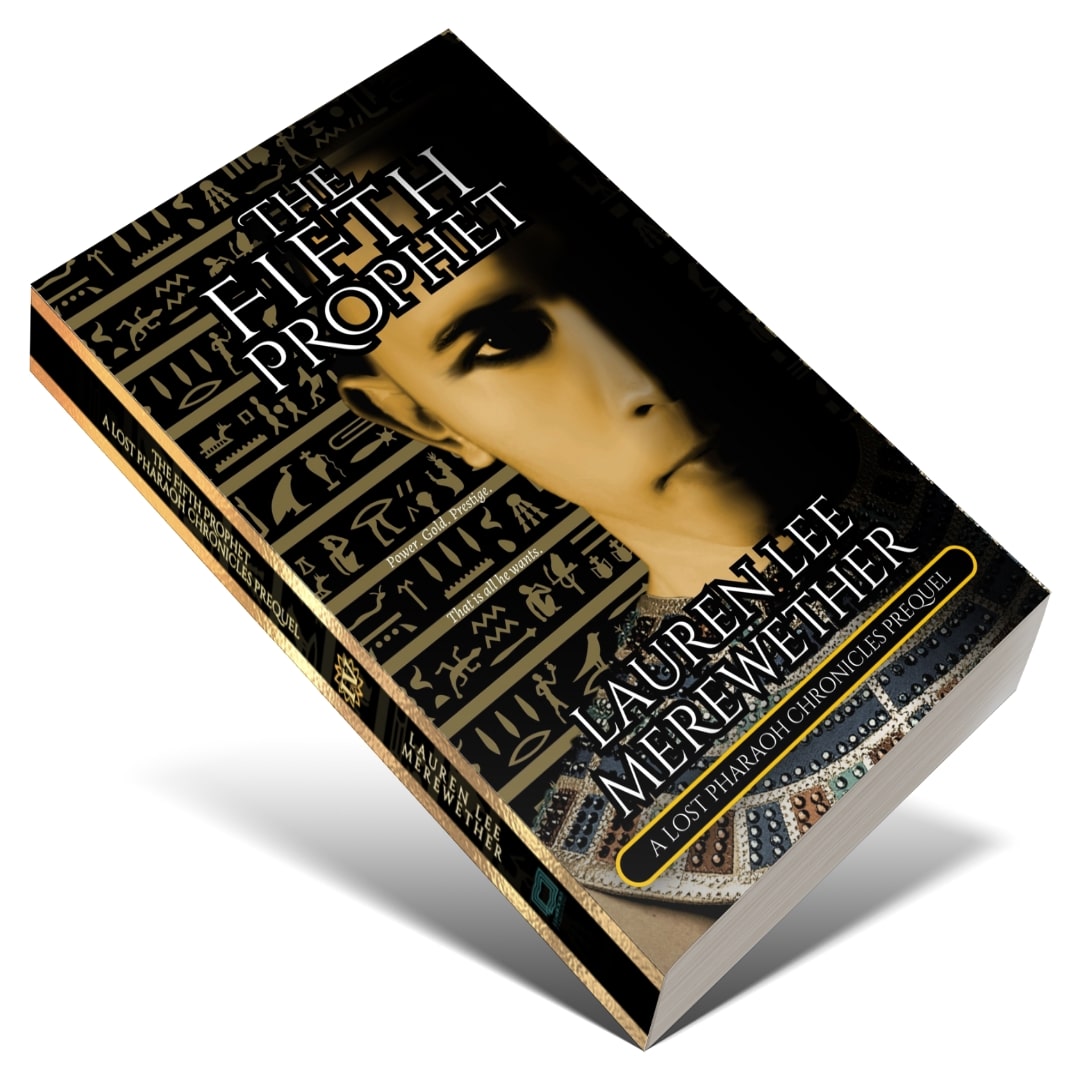
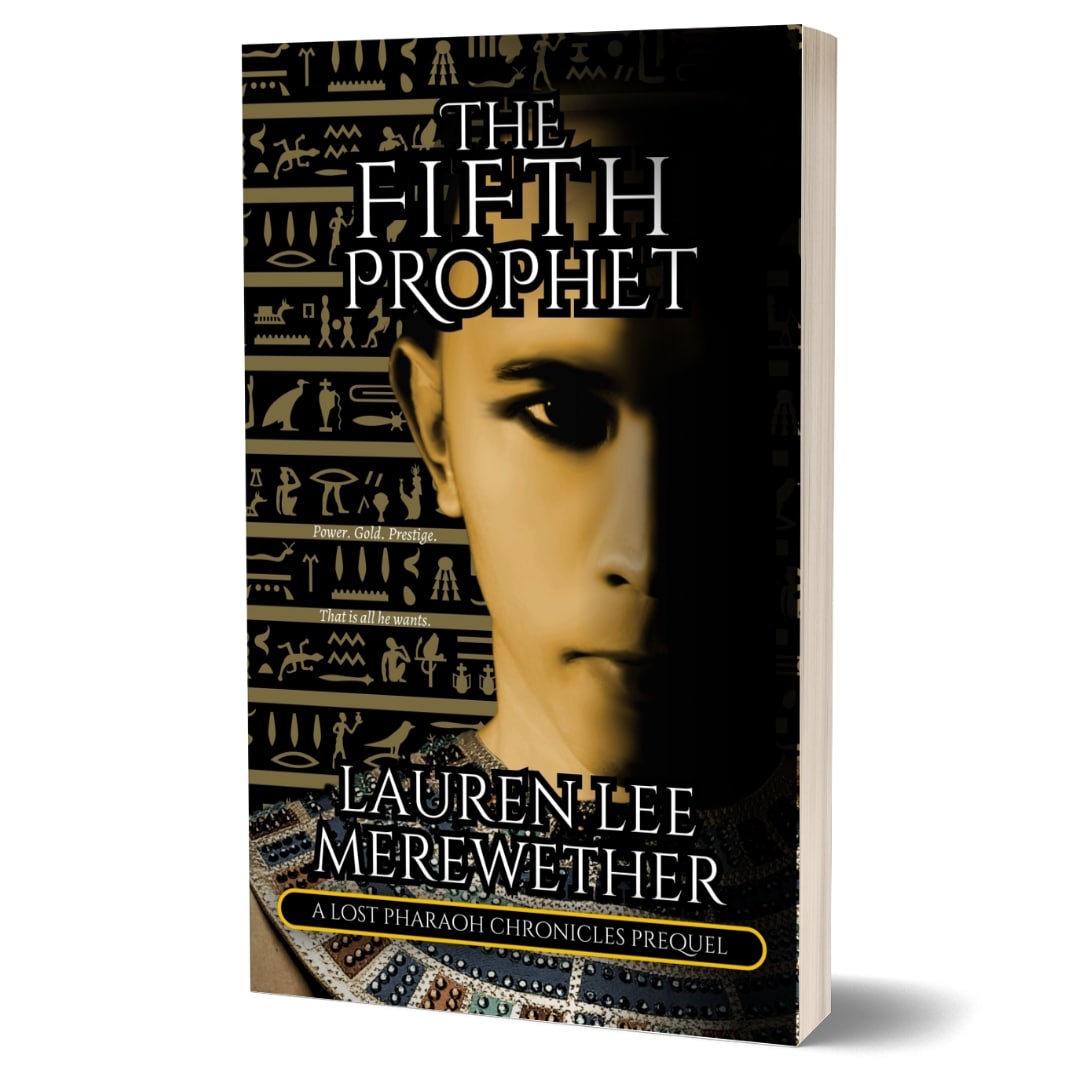
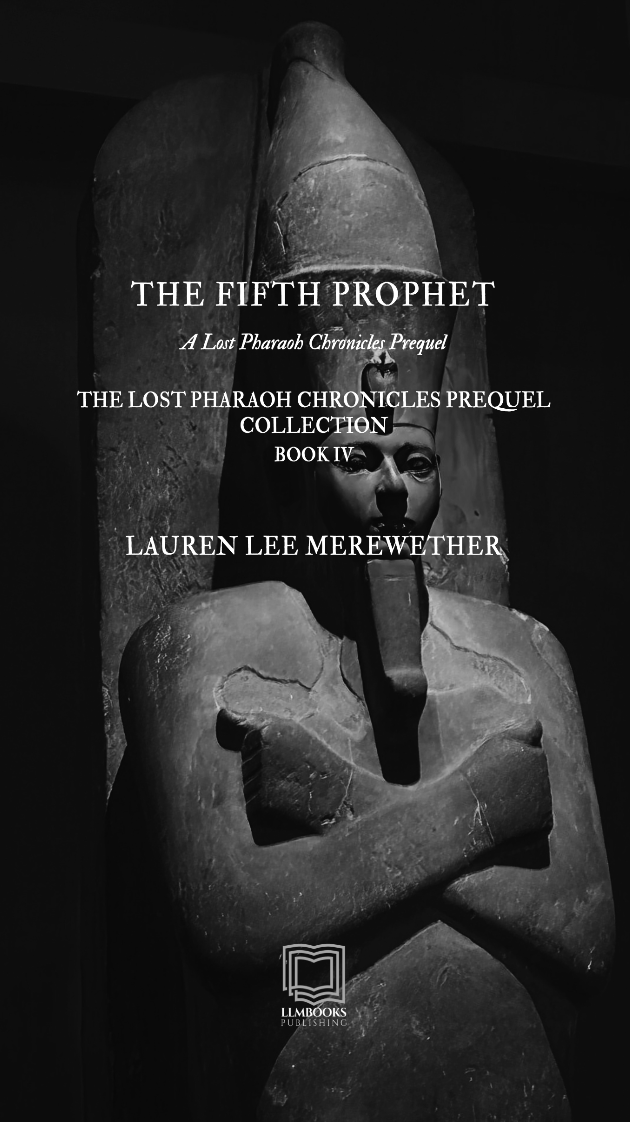
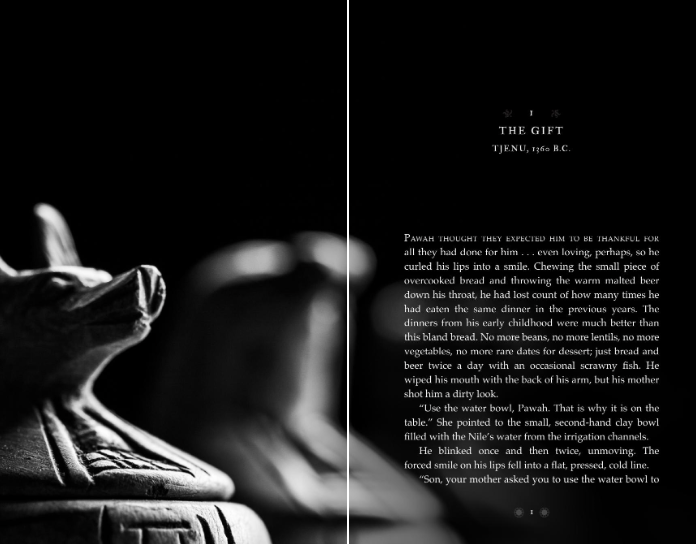
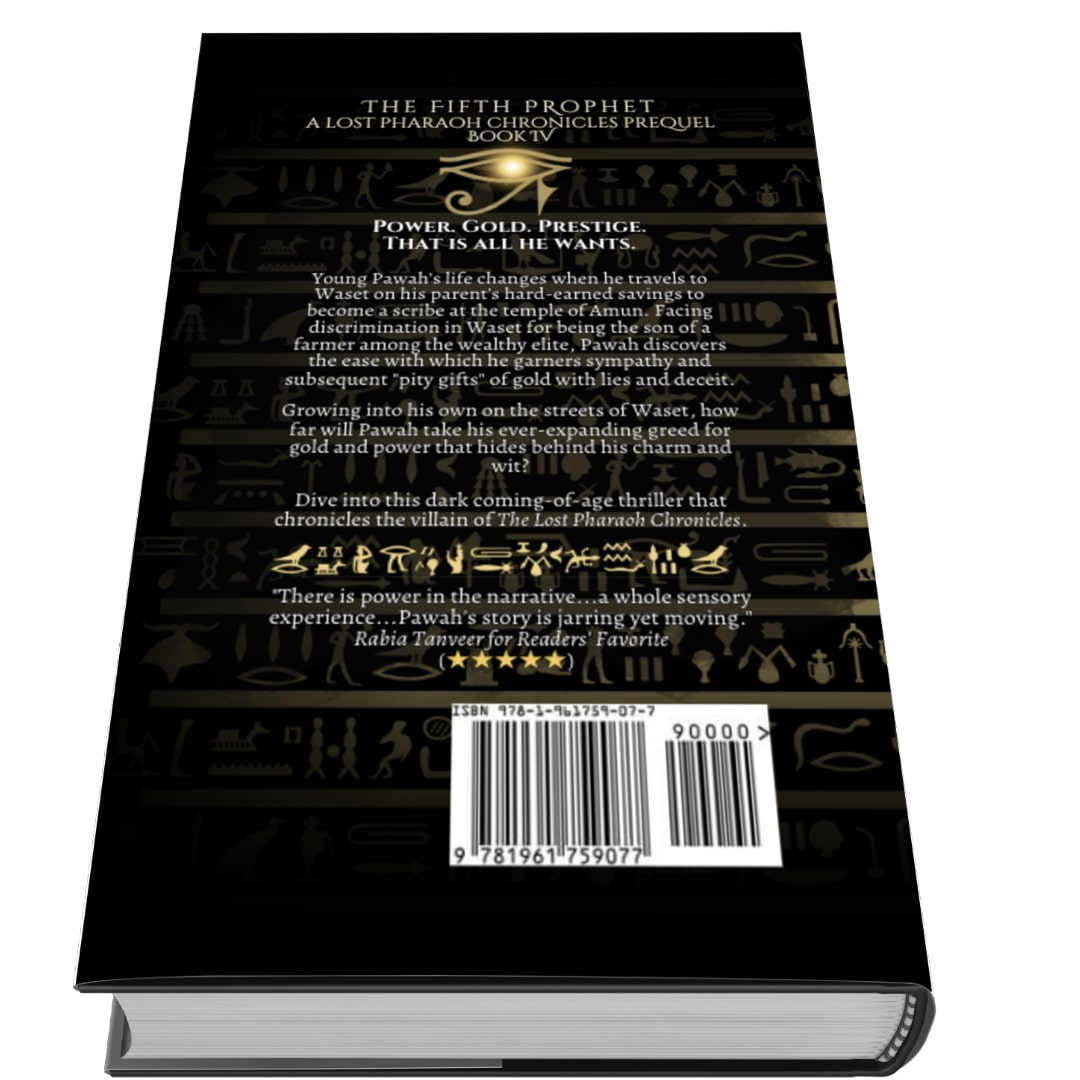


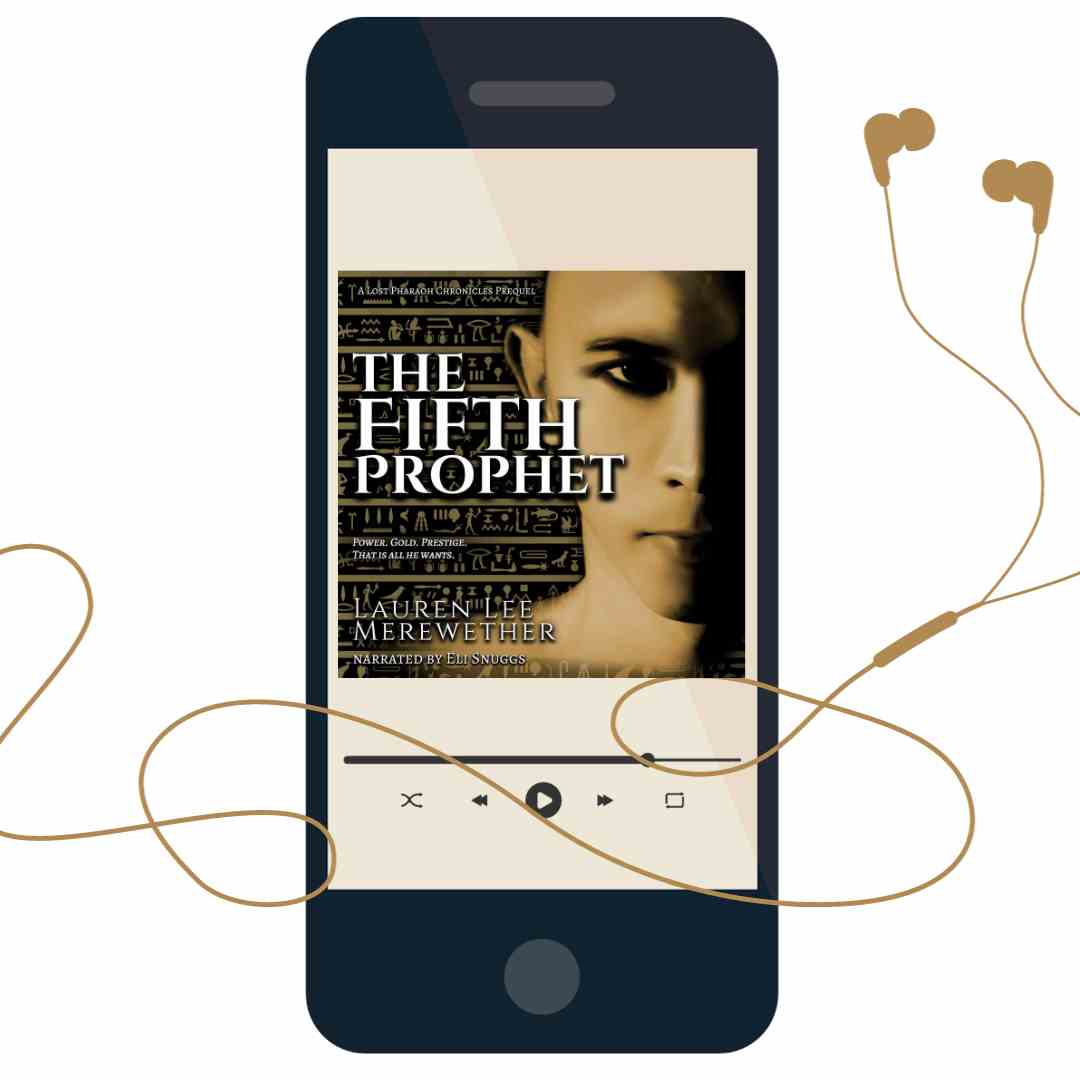
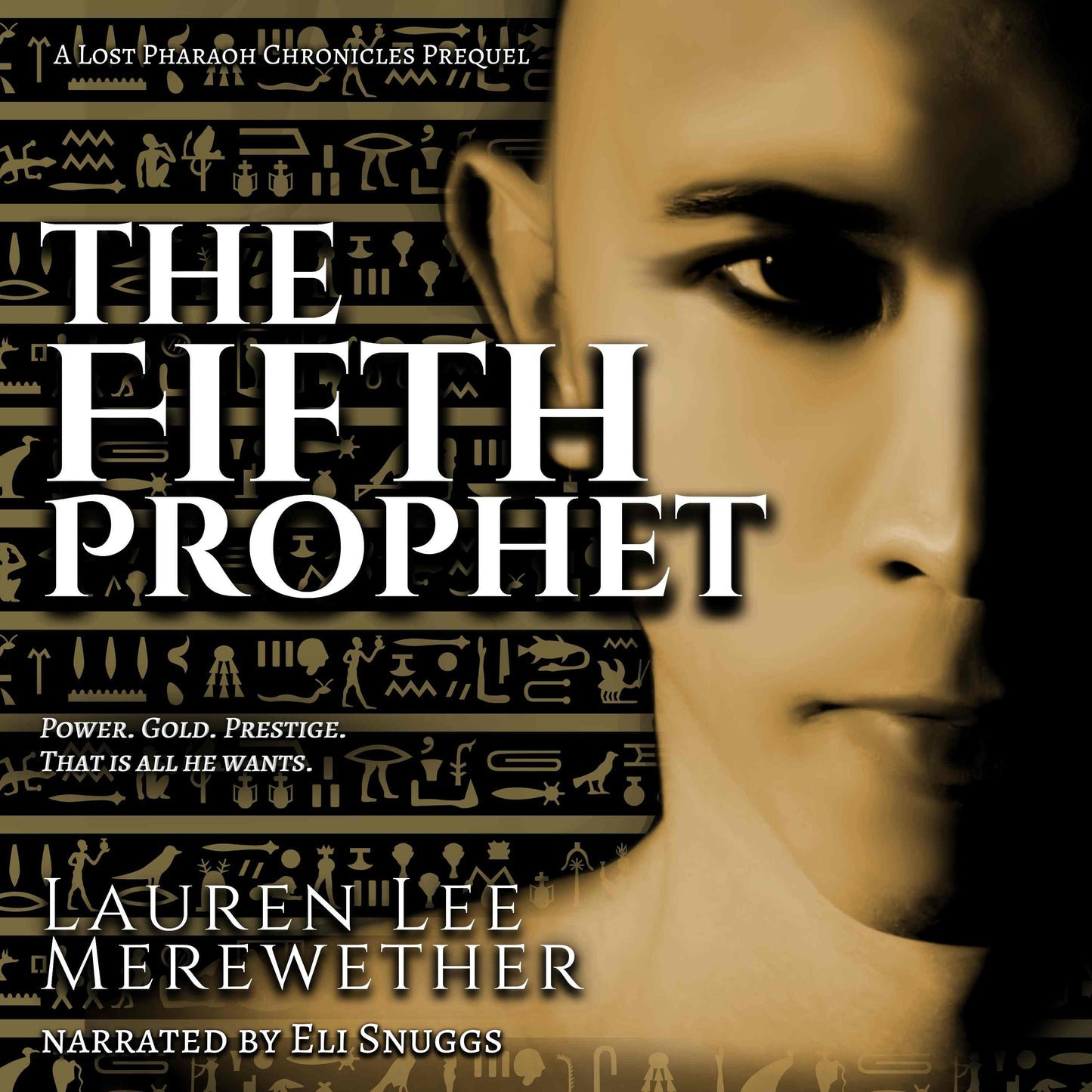
PRAISE FOR THE FIFTH PROPHET
-
(★★★★★)
"...a highly immersive and character-driven work of fiction with plenty of dark dramatic twists...follow the rise of a villain with such close emotion, investment, and even sympathy for this devilish character. I would highly recommend The Fifth Prophet to fans of historical thrillers, emotive and dark origin stories, and for Egyptophiles everywhere." - K.C. Finn for Readers' Favorite
-
(★★★★★)
"There is power in the narrative...a whole sensory experience...Pawah's story is jarring yet moving..." - Rabia Tanveer for Readers' Favorite
-
(★★★★★)
"The Fifth Prophet twists the heart...a unique insight into a villain's mind and motives..." - Jessica Barbosa for Readers' Favorite
-
The Fifth Prophet was a semi-finalist in the 2021 KBR Awards in Horror/Suspense.
The Lost Pharaoh Chronicles Prequel Bundle
Share






